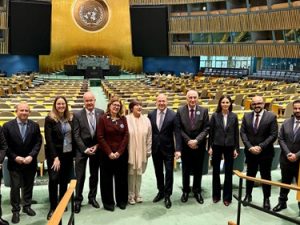A groundbreaking statistical framework, developed under the leadership of UN Tourism, has been adopted by all 193 UN member states. The Statistical Framework for Measuring the Sustainability of Tourism (MST) thus becomes the internationally agreed reference framework for measuring the economic, social and environmental aspects of tourism. The adoption by the UN Statistical Commission at its 55th session marked a historical milestone towards harnessing the full potential of the sector, providing a solution to the pressing need for a harmonized methodology to effectively assess the sustainability of tourism. “Tourism is a powerful force for positive change when managed responsibly and sustainably,” says Zurab Pololikashvili, UN Tourism Secretary General. “The adoption of the Statistical Framework for Measuring the Sustainability of Tourism marks a paradigm shift, going beyond GDP by enabling the measurement of what matters most to people and planet.” The adoption of the Statistical Framework for Measuring the Sustainability of Tourism marks a paradigm shift, going beyond GDP by enabling the measurement of what matters most to people and planet Collaborative effort This achievement is the fruit of a seven-year UN process led by Austria and Spain as co-chairs of the UN Tourism Committee on Statistics, with Saudi Arabia and Seychelles as co-vice chairs. Under auspices of the Committee, the Framework was developed thanks to the extraordinary work of the multistakeholder Expert Group on Measuring the Sustainability of Tourism composed of 40+ countries and 30+ international and regional organizations including the UN Statistics Division, the International Labour Organization (ILO), subnational authorities and observatories, academia and others. The work involved technical guidance from an Editorial Board chaired first by the Philippines and then by Canada, as well as extensive engagement and consultation with …
Read More »
Breaking News
- Dusit International expands Saudi portfolio with new dusitD2 resort in Al Ahsa
- Emirates prohibits use of any kind of power bank onboard Emirates flights from 1st October 2025
- Red Sea Global unveils ‘Red Sea Health’ with first facility opening at new airport
- Department of Culture and Tourism – Abu Dhabi extends partnership to host multiple UAE Warriors events in Al Ain Region
- PIF and Golf Saudi launch PIF Future Fairways, showcasing the future of golf in Saudi Arabia
- Riyadh Air signs global distribution agreement with Amadeus in preparation for take-off
- Diriyah and THC explore new urban air mobility ventures
- VFS Global renews contract for Germany visa services across the Middle East; adds four new locations to the network
- Mileo The Palm, Hotel and Residences to open by this September
- RateHawk study reveals 92% of travel professionals are purpose driven
- Oman Air Holidays launches new digital platform with TUI
 Tourism Breaking News
Tourism Breaking News
